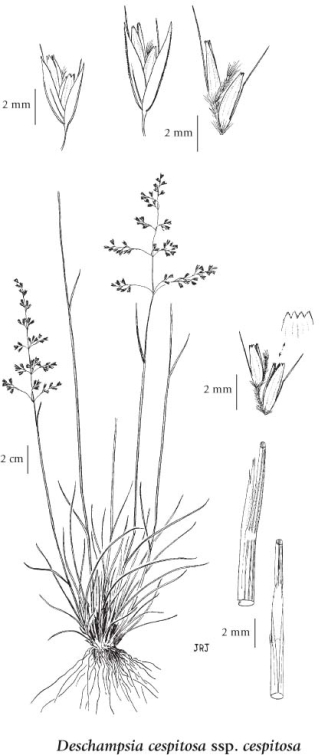Deschampsia cespitosa (L.) P. Beauv. subsp. cespitosa
tufted hairgrass
Poaceae (Grass family)
Introduction to Vascular Plants
tufted hairgrass
Poaceae (Grass family)
Introduction to Vascular Plants
Map click to expand contents
Distribution of Deschampsia cespitosa subsp. cespitosa
Click here to view the full interactive map and legend
Species Information click to expand contents
General:
Perennial, strongly tufted grass from fibrous roots, stems numerous, 20-120 cm tall.
Leaves:
Sheaths open, smooth to rough; blades matted at the base, rather stiff, sometimes flat but most folded or in-rolled, smooth to rough below, rough above, with a few, prominent, raised nerves, 1.5-3 (4) mm wide; ligules entire but often split, hairy, sharp-pointed or rounded, 4-8 mm long.
Flowers:
Inflorescence a loose and open to narrow panicle, 8-30 cm long, the branches spreading or drooping to erect (even at maturity); spikelets usually glistening, purplish to tawny, 2-flowered, rarely 3-flowered, glumes rather narrow, the lower ones 1-nerved, 2.5-5 (6) mm long, the upper ones 3-nerved, often somewhat jagged, 3-6 (7) mm long; lemmas 5-nerved, 2.5-4 mm long, the tips jagged and 4-toothed, awned from the base, the awns 3-5 mm long, straight or bent, the callus hairs about 1 mm long; lodicules egg-shaped to lanceolate, 0.7-1 mm long, anthers 1.2-2.2 mm long.
Notes:
This is a widespread, difficult complex and until an adequate monographic study is undertaken we are recognizing only two subspecies for BC:
1. Glumes mostly 5-7 mm long; lemmas averaging 4 mm long; panicles open during flowering .... ssp. beringensis (Hult.) Lawrence
1. Glumes mostly less than 5 mm long; lemmas averaging 3.5 mm, if longer then the panicles closed at flowering .... ssp. cespitosa
Illustration click to expand contents

If more than one illustration is available for a species (e.g., separate illustrations were provided for two subspecies) then links to the separate images will be provided below. Note that individual subspecies or varietal illustrations are not always available.
Illustration Source: The Illustrated Flora of British Columbia
Ecology click to expand contents
Ecological Framework for Deschampsia cespitosa ssp. cespitosa
The table below shows the species-specific information calculated from
original data (BEC database) provided by the BC Ministry of Forests and Range.
(Updated August, 2013)
The table below shows the species-specific information calculated from
original data (BEC database) provided by the BC Ministry of Forests and Range.
(Updated August, 2013)
| Site Information |
Value / Class |
||
|
Avg |
Min |
Max |
|
| Elevation
(metres) |
0 | 0 | 0 |
| Slope
Gradient (%) |
0 | 0 | 0 |
|
Aspect (degrees) |
0 | ||
| Soil
Moisture Regime (SMR) [0 - very xeric; 4 - mesic; 8 - hydric] |
6 | 6 | 6 |
| Modal
Nutrient Regime
Class |
D | ||
| #
of field plots species was recorded in: |
1 | ||
| Modal
BEC Zone Class |
CWH | ||
|
All BEC Zones (# of stations/zone) species was recorded in |
CWH(1) | ||
|
Source:
Klinkenberg 2013
|
|||
Habitat and Range click to expand contents
Saline meadows, beaches and tidal marshes in the lowland zone and moist meadows in the montane to alpine zones (ssp. beringensis) and moist to mesic meadows, lakes shores, rocky ridges, shrub-carrs and talus slopes in the montane to alpine zones (ssp. cespitosa); ssp. beringensis - common along the coast, ssp. cespitosa - common in and E of the Coast-Cascade Mountains in BC; ssp. beringensis - amphiberingian, N to AK and S to N WA; ssp. cespitosa - circumpolar, N to AK, YT and NT, E to NF and S to ME, MA, PA, NC, KY, IL, MN, SD, NM, AZ, and CA; Greenland, Eurasia
Synonyms click to expand contents
Synonyms and Alternate Names:
Deschampsia holciformis J. Presl